on the harmful myth of "once an addict, always an addict"
how this common misconception fuels the vicious cycle of shame & stigma in addiction; and how to do recovery in a more sustainable way - an essay inspired by "The Outrun"
The quotes in the picture stem from the marvellous movie “The Outrun” by Nora Fingenscheidt, telling the story of Rona (incredibly played by Saoirse Ronan), struggling with alcohol addiction and her journey through recovery. The film is an honest portrayal of addiction and its destructiveness. Hence, it also includes some common beliefs around addiction recovery à la “once an addict, always an addict.”
Recovery is often seen as a lengthy battle with your addicted self, something you have to bravely endure with strong willpower, force yourself to not give in to the alluring craving for the addictive substance and its pleasures.
”life after rehab never gets easy, it just gets less hard”
Sobriety from this perspective means a joyless, dull life since you wasted your opportunity to keep on enjoying easygoing, carefree fun. Now it’s time to atone by sheer self-castigation.
This was the type of energy I encountered when I went to my first Gamblers Anonymous meeting: a circle of broken middle-aged men - miserable and defeated - sharing how they spent their entire salary on the first of the month on gambling instead of feeding their families. The GA meeting still helped me big-time: it made me realise that I reeeally needed to quit or my misery would just continue forever. In the movie, the rehab instructor tells the group of addicts that only 1 out of 10 will make it, the other 90% will be back to drinking soon. Who is going to be lucky one who won’t fail? Once an addict, always an addict.
seeing through the delulu-ness of addiction
This type of mindset reflects the current mainstream view on addiction. At the same time, it blatantly reveals two closely connected false beliefs many addicts fall for.
The first is the core delusion that created the dependence in the first place: being convinced that we actually need the substance/the behaviour/the addiction - that it makes us a better person or enhances our life. That it makes us more fun, more loose, more exciting, more relaxed, less inhibited or whatever we feel we’re lacking without it.
I can’t be happy sober
In the movie, we see Rona go to AA meetings and share her struggles with a sober life. She misses the euphoria of drunkenness, is convinced that she can’t be happy sober. I went into detail about how seeing through this illusion is the most important step in freeing oneself of the claws of addiction.
Yes, some substances or behaviours can create pleasure and do indeed feel good, but let’s be honest, as soon as you start misusing the habit, all perks of it get quickly eradicated. What’s left is not fun or pleasant at all, it just flat-out sucks. Once you’re kneedeep in the addiction cycle, the only purpose of using is just to feel a little less shitty & ashamed about yourself and to have a short break from all the self-loathing. Proper addiction is not because the substance is so wonderful - let’s not fool ourselves.
willpower alone won’t save us
Why is it so crucial to see through the illusions of addiction? Because willpower alone won’t get us far. Let’s be honest, if discipline is the only thing we have to combat addiction, our willpower is bound to break sooner or later. There will be a day, where a ton of shitty things come together, where we don’t feel like fighting, where we’re just tired of all this self-will, where we surrender to the addiction and relapse. Every addict has been there. I certainly have been there plenty of times. Witnessing one’s own powerlessness leaves one feeling even more defeated. The following shame and hopelessness even further cement the belief that we can’t live without the addiction. The inner voice gets even louder: you ain’t shit! Subsequently, succumbing to the addiction reaches unseen levels.
second delusion: “addicts will never be fully recovered”
The second delusion concerns rehab and how harmful the “once-an-addict-always-an-addict”-mindset can be for recovery. Alcoholics Anonymous and other organisation refer to abstinent addicts as “recovering” not “recovered”, regardless of how long they have been sober. An addict is doomed to never reach the “cured" state.
Clinical textbooks advise: “For addiction patients, recovery is a never-ending process; the term cure is avoided.” It means I will forever have to label myself an addict, creating lifelong stigmatisation and shame. It means I can never be fully trusted again.
once depressed, always depressed?
Adi Jaffe, author of “The abstinence myth”, rightly points out that as an former addict himself he will always be required to wear this coat of condemnation. Further, he asks: “What if we stopped telling people they are stuck in this terrible state and instead supported their agency and ability to change?”. How are addicts supposed to re-gain self-trust if everyone is telling us, that we are doomed from the start? Jaffe continues: “Could we imagine telling someone with depression, "Once depressed, always depressed?" Or saying to someone who is struggling financially "Once broke, always broke?"“.
half-baked attempts don’t work
I get why so many organisation and therapists use this drastic terminology and these strict measures to treat addiction. The addicted brain would look for any tiny loophole to continue using and just the slightest possibility of not having to quit could be enough to keep the flame of addiction alive.
It’s true that addicts need some strictness and discipline to quit - half-baked attempts won’t work. Not as long they don’t put in the additional work to heal the underlying patterns. I still remember vividly how my addicted self would make lofty promises to loved ones - assuring everyone that I will quit for sure - while at the same time thinking of inventive ways to still continue to gamble that same day. As long as I was still believing the delusions of addiction, I was not to be trusted and full recovery seemed impossible. I was still convinced that I needed the addiction.
the opposite of addiction is connection, not sobriety
So what would be a more useful goal to strive for if not sobriety? What is the opposite of addiction if not sobriety? Maybe it's connection. Martin Sheen described addiction as a misdirected search for transcendence, connection and love (shoutout to
, I learned this in his book “The Art of Losing Control”). And I wholeheartedly agree with this notion.connection is why we’re here
Striving for connection seems much healthier and sustainable in overcoming addiction than just simply seeking full sobriety. Without spoilering too much of the movie, Rona is as well looking for a way to connect with numbed and disconnected parts of herself during her recovery. My own healing journey brought me back over and over again to the theme of connection - connection to other people, connection to myself, connection to nature, connection to something bigger than myself (whatever that might be).
I guess it’s not a coincidence that I felt the loneliest during my years of addiction. I am also convinced that it’s much easier to go through recovery when life stays somewhat exciting and you don’t punish yourself with a monk-like life. But maybe we can find healthier (and realer) outlets for excitement, transcendence and connection. Like doing the things you always wanted to do but were too afraid to.
What keeps us sober is love, and connection to something bigger than ourselves.
I can say that I am a recovered addict
Now that I went through recovery, I feel like a recovered, not just a recovering addict. I would call myself a former addict. While I know that I can still have a tendency for addictive behaviour, I don’t feel like an addict anymore.
It’s not because I am naive or ignorant towards the risk of relapse, it’s just that I genuinely don’t feel like I used to feel when I was an addict.
I don’t feel like there is an emptiness, a void inside myself that I need to fill.
I do feel connected.
an inner radar system for dependency
I have not felt any cravings for gambling in years and I’m confident that this is a permanent change. Obviously, I still have to be careful. I’m super sensible and attentive to any type of addictive pattern. It’s like I have an inner radar system detecting just the slightest signs of dependency, knowing all to well how quickly I could get sucked back into a full-blown addiction.
Yet, I feel a deep change within myself through all the work I have put into my healing. And I’m convinced that every addict can go down the same road of full recovery. It’s not easy, but over time it gets less hard. I wholeheartedly believe in the human ability to change and every addict should believe in their healing power and agency. Everyone should feel empowered to go through rehab and leave their addiction behind. My and thousands of other addicts’ recoveries are proof that change and cure is possible. We are not addicts anymore.
one last public service announcement
Buuuut just to make sure that the message won’t be mistaken as another loophole to continue using even though it’s clear that one should quit.
“Look, I don’t need to be sober to heal. I got this under control." No, you probably don’t.
The classic case for “two things can be true at the same time” - yes, while we can heal from addiction, we should still take our addictions seriously and not sugarcoat them. If the prospect of being sober for the rest of your life, creates deep anxiety in you, then it might be a hint at some form of dependency. And then it might be a good idea to go sober for at least a while to face your sobriety-fears and realise that you don’t need the substances. Brené Brown used the term “a pupu platter of addictions”—not too much of any one thing, but enough of each one to be concerned, which is something to keep in mind when we tend to diversify our ways of covering up pain. <3





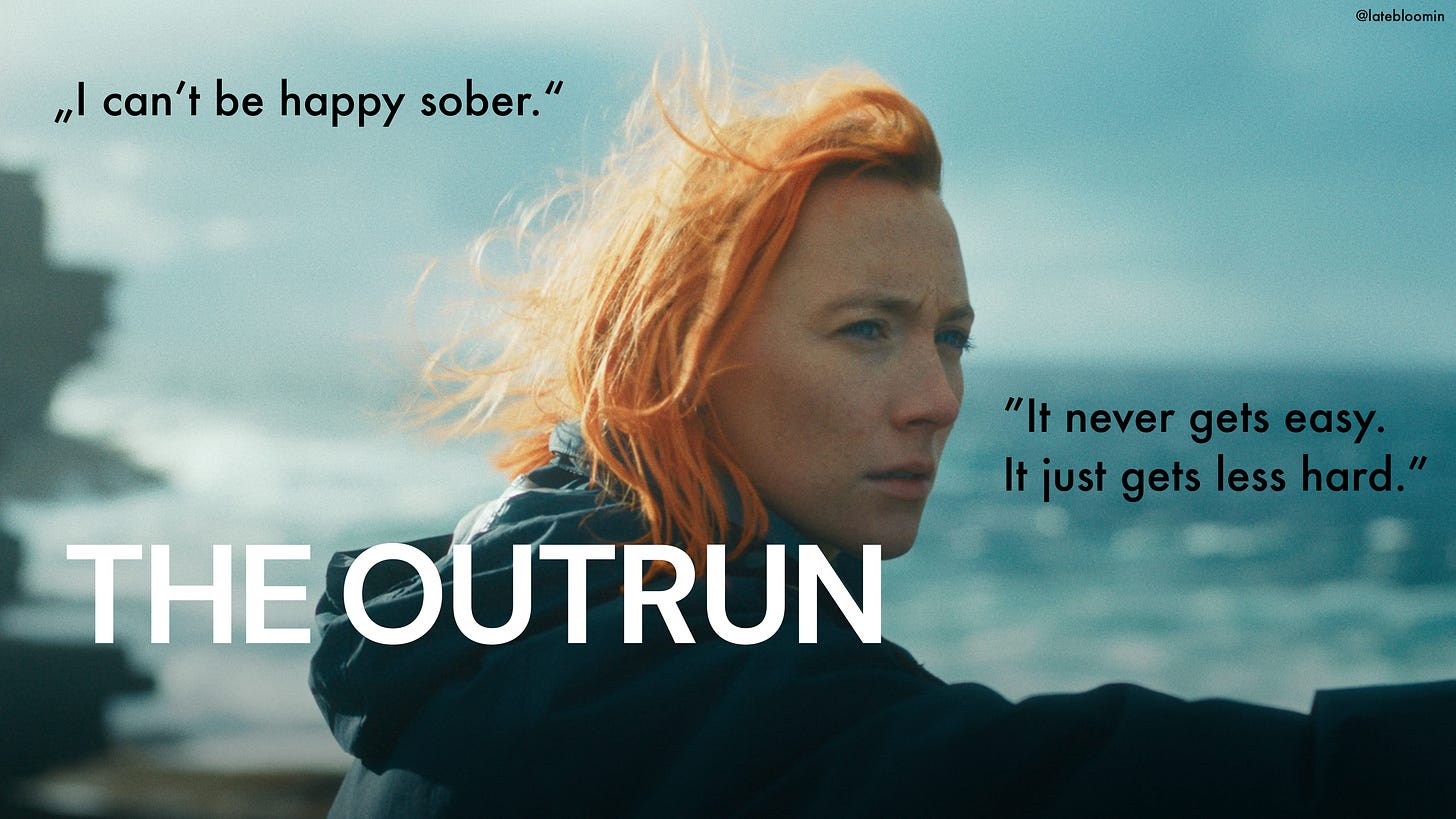
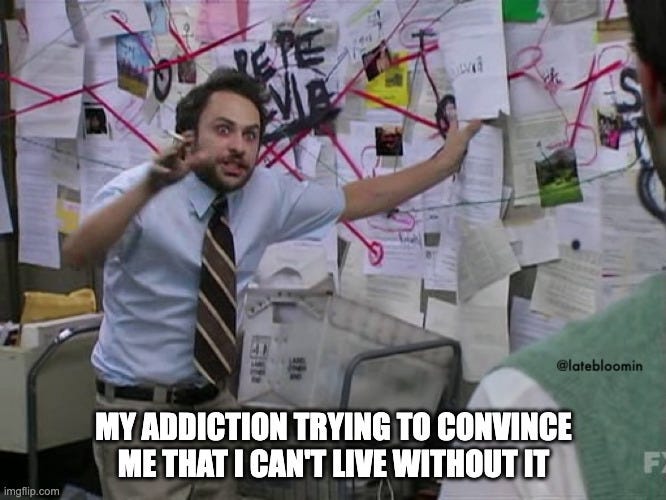
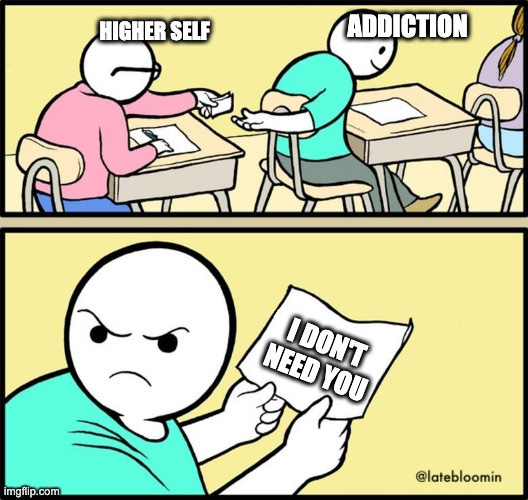
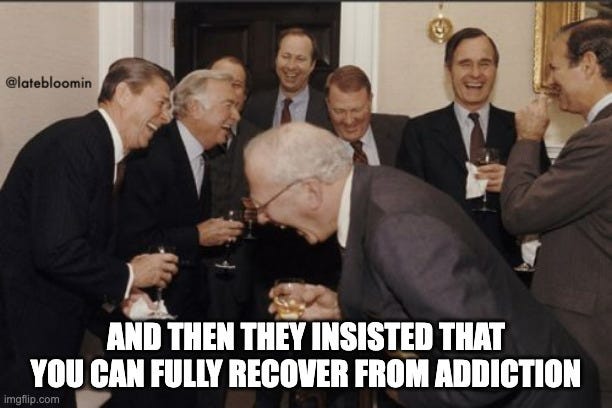
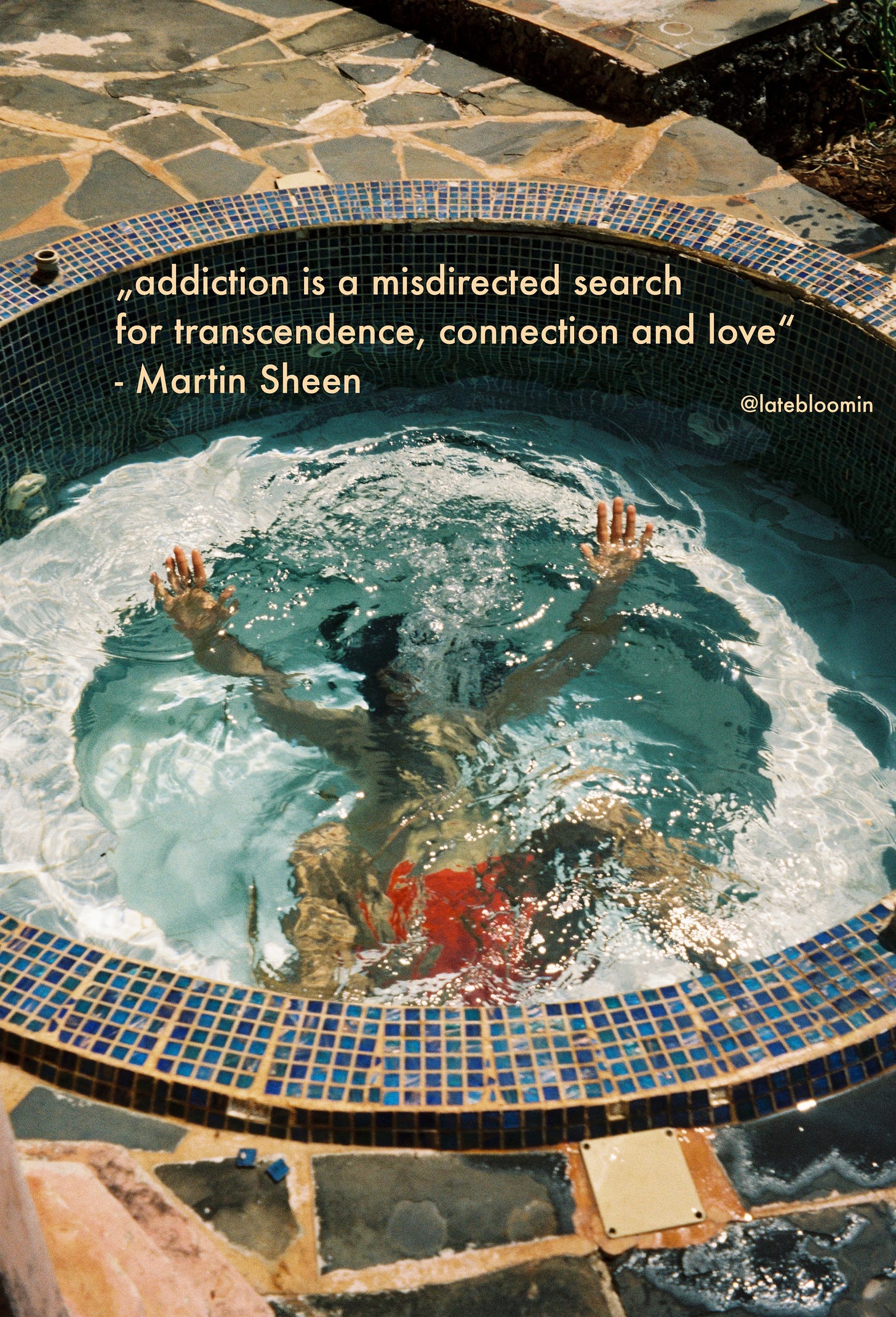
Love this! It’s something I’ve been thinking about a lot lately. As long as I’ve been using cannabis daily, and was briefly in what I would define as addiction, I’ve been working towards a healthier relationship with the substance and with joy in general. I thankfully have never planted these problematic narratives into my own life, but I’ve observed them given out to other people as solid advice, which has always concerned me but it took me a while to figure out if it was discomfort with the truth (and what it meant for me) or discomfort with the false truth these ideas present. You have such a well rounded way of looking at this issue that I appreciate greatly. There are in fact use cases for strict thinking in addiction recovery, but the way we let addiction seep into personhood is so toxic. It’s like trying to flip the preexisting internal environment, one that tells you your addiction is essential to your life and who you are, into one that tells you recovery from that addiction is all you are. Addiction is a symptom and a behavior! Not the *core* of the way you were built.